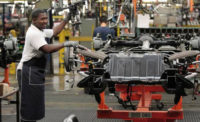Electrification isn’t the only paradigm shift transforming the automotive manufacturing landscape today. Sustainability is also forcing companies to rethink traditional production models. A new initiative involving some of the auto industry’s biggest players will affect the global supply chain.
The Automotive Industry Action Group (AIAG) and Drive Sustainability recently unveiled an updated version of the “Automotive Industry Guiding Principles to Enhance Sustainability Performance in the Supply Chain.” The reference document aims to address the latest trends and industry expectations on supply chain sustainability.
AIAG is a 40-year-old not-for-profit organization where automakers, suppliers and other entities work collaboratively to drive down cost and complexity within the supply chain, which involves thousands of companies and multiple tier levels. The organization is made up of more than 4,000 companies in over 70 countries.
Each member is encouraged to donate the time of volunteers to work collaboratively in a legal, noncompetitive, open forum to develop recommendations, guidelines and best practices. On an annual basis, more than 900 volunteers provide subject matter expertise to industry initiatives focusing on manufacturing, quality, supply chain and corporate responsibility.
“We are clearly at an inflection point in the evolution of automotive power train development,” says J. Scot Sharland, CEO emeritus of AIAG. “Given the impact of the Great Recession, Baby Boomer retirements and the COVID-induced ‘great resignation,’ the industry is also facing challenges in the recruitment and retention of the next generation of talent needed to manage this transition.
To ensure that legacy continues in the decades ahead, Sharland and his colleagues recently unveiled an important revision to AIAG’s landmark 2014 “Automotive Industry Guiding Principles to Enhance Sustainability Performance in the Supply Chain.”
Executives from a variety of automakers participated in the new document, including BMW, Daimler, Ford, General Motors, Honda, Jaguar Land Rover, Nissan, Stellantis, Toyota, Volkswagen and Volvo.
According to Sharland, “this extraordinary alignment between automakers was the result of a need to address critical issues impacting today’s industry, and to speak with a unified voice on the importance of a sustainable, ethical supply chain.”
The revised Guiding Principles offer more expansive and thorough guidance on the latest industry expectations for sustainability.
“Recent and emerging legislative mandates, coupled with the ongoing complexity of today’s global supply chain, make these revisions to the Guiding Principles more vital than ever,” explains Tanya Bolden, director of corporate responsibility and supply chain products and services at AIAG.
“The engagement between automotive companies and their suppliers becomes a real force for the sustainability transformation,” adds Stefan Crets, executive director of CSR Europe and Drive Sustainability. “This is enforced by the increased attention for a due diligence approach by legislators that also includes a proactive way of tackling issues.”
New and Improved
The revised Guiding Principles now include sections on circularity, carbon neutrality, animal welfare, biodiversity, land use and deforestation. As a companion piece, AIAG’s supplementary “Global Automotive Sustainability Practical Guidance” has also been updated to better reflect current practicalities and legalities of meeting these industry expectations.
Automakers in Asia, Europe and North America plan to use the Guiding Principles to monitor their extensive supply chains.
“Sustainability matters beyond individual companies and the forward-thinking Guiding Principles speak to the industry’s commitment, collaboration and continued necessity to speak with one voice across the automotive supply chain,” says Mike Lapham, business unit lead at Honda Development & Manufacturing of America LLC.
“Sustainability sits at the heart of our Reimagine strategy and is an integral part of our vision of modern luxury,” adds François Dossa, executive director of strategy and sustainability at Jaguar Land Rover. “As part of our journey to Net Zero by 2039 and aligned to our Science-Based Targets initiative goals by 2030, we are proud to have played a vital role alongside other partners in updating the Automotive Guiding Principles.
“We know that collaborating with world leaders and experts in their fields is the way to drive real change within the industry across the entire ecosystem, from manufacturers to suppliers,” explains Dossa.
“A company with Ford’s scale can really influence the supply chain and business practices across our entire industry,” adds Sue Slaughter, purchasing director at Ford Motor Co. “It is so important that we not only think about how [we] can use our purchasing power to fuel our business needs, but also to advance sustainability.”
Because the automotive supply chain is extremely complex, the Guiding Principles contain expectations about business ethics, working conditions, human rights, health and safety, environmental leadership and supply chain due diligence for suppliers at all tiers. All suppliers are expected to uphold these standards and enforce them throughout their supply chain.
The Guiding Principles are based on fundamental elements of social, environmental and governance responsibility that are consistent with applicable laws and international standards created by organizations such as the United Nations.
Topics covered under the revised guidelines include the following:
- Business ethics, including counterfeit parts and data protection.
- Environmental issues, such as air quality, carbon neutrality, chemical management, circularity and water management.
- Health and safety issues, such as personal protective equipment and workspace.
- Human rights and working conditions, such as benefits, wages and working hours.
- Responsible supply chain management, such as ethical sourcing of raw materials.
BMW Initiative Targets Sustainable Packaging
The BMW Group has implemented several projects in its packaging logistics unit to help the environment and conserve resources. The goal of the initiative is to work closely with suppliers to reduce carbon emissions and adhere to the principles of a circular economy.
BMW’s European assembly plants are using more recycled material in their packaging. For newly awarded contracts, the proportion of recycled material in reusable packaging for logistics purposes will almost double this year from around 20 percent to over 35 percent.
Using alternative sustainable materials, reducing single-use packaging, introducing lightweight packaging in certain areas and reducing transport volumes will also help cut carbon emissions.
BMW is monitoring the impact of individual measures via a CO2 calculator for packaging. The automaker’s overall aim is to reduce CO2 emissions in the supply chain by 20 percent per vehicle compared to 2019.
“Our re:think, re:duce, re:use, re:cycle approach is being implemented consistently in packaging logistics,” says Michael Nikolaides, head of production network and logistics at BMW Group. “We’re using innovative strategies to consistently reduce the volume of resources we use, thus reducing our carbon footprint.
“We are also doing our part to get the BMW iFACTORY up and running, with a particular focus on the ‘green’ side of things…with an emphasis on flexibility and efficiency, sustainability and digitalization,” explains Nikolaides. “It provides an answer to the challenges involved in the transformation to e-mobility and [leverages] the latest technologies to create a production process that uses minimal resources.”
According to Nikolaides, BMW is using more recycled material, such as expanded polypropylene (EPP) packaging. “Our newly developed EPP packaging already contains 25 percent recycled material,” he points out. “EPP is used in special containers, as its shape can be adapted to the components being packaged, allowing them to be transported safely.
“Around 360,000 of these containers are needed each year,” claims Nikolaides. “Using 25 percent recycled material allows us to save almost 280 tons of CO2 annually. There are plans to increase this proportion of recycled material even further, with the first pilot schemes with 100 percent recycled material currently underway. If these tests are successful, this configuration will become standard for new contracts from 2024.
“An additional 680 tons of carbon emissions savings can be made every year by using covers and so-called small load carriers with 50 percent recycled contents,” says Nikolaides. “As things stand, these measures are focused within the European markets due to the current waste management situation and available recycling infrastructure. But, we are working toward expanding to our locations in China, Mexico and the United States.”
BMW also plans to use folding large load carriers in place of traditional pallet cages made of steel. The plastic alternatives will be made from over 90 percent recycled material. They work in a similar way to the collapsible shopping crates that most people are familiar with.
When they’re empty, the carriers can be folded up, making them easier to transport. Nikolaides claims that using 15,000 of these new containers will reduce CO2 by around 3,000 tons per year.
“When it comes to packaging, the sky’s the limit,” says Nikolaides. “We’re launching pilot projects using bio-based materials to replace oil-based substances such as polyethylene and polypropylene.
“We are also investigating whether and in what ways we can use materials from recycled household appliances in our packaging,” explains Nikolaides. “In the long term, our aim is to use alternatives to raw materials across the board.”
“As the technical complexity of vehicle design has dramatically increased over the past 40 years, so has the quality, reliability and performance of the products we manufacture,” adds Sharland.







